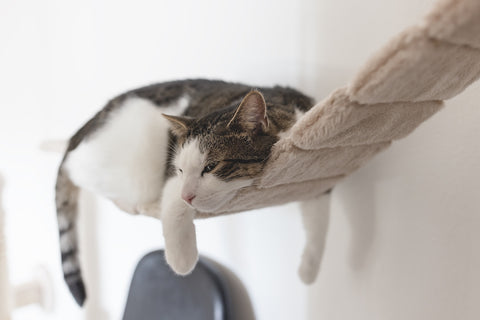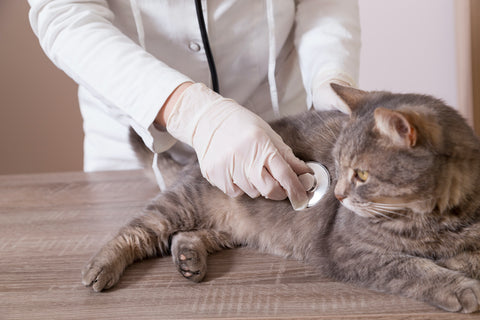Purring or Pain: Do Cats Get Headaches?
Cats are mysterious creatures with their own set of behaviors, ailments, and quirks. As cat owners, we often find ourselves wondering about their health and well-being, including whether they can experience headaches. While cats cannot express their discomfort in words, they can display subtle signs that may indicate they are suffering from a headache.
Do Cats Get Headaches? Understanding Feline Headaches
In this blog article, we'll explore the possibility of cats experiencing headaches, their potential causes, and how you can help alleviate their discomfort.
Can Cats Get Headaches?
The short answer is yes; cats can experience headaches. Just like humans, cats have complex nervous systems, and various factors can lead to head pain in felines. While we can't ask our cats directly if they have a headache, we can look for signs and symptoms that may suggest they are in pain.
Signs of a Cat with a Headache
Change in Behavior: Cats are known for their aloof and independent nature, but if your cat suddenly becomes withdrawn, irritable, or less active than usual, it could be a sign of a headache.
Sensitivity to Light and Sound: If your cat seems to shy away from bright lights or loud noises more than usual, it may indicate sensitivity to stimuli, which can be a symptom of a headache.
Pawing at the Head: Cats may paw or rub at their heads when they're in pain or discomfort, which could be a sign of a headache.
Loss of Appetite: A cat with a headache may lose interest in food or water, leading to a temporary loss of appetite.
Unusual Vocalizations: Some cats may vocalize more when they are in pain or discomfort, so if your cat is meowing more than usual, it could be a sign of a headache.

Common Causes of Cat Headaches
Understanding the causes of headaches in cats can help you identify potential triggers and prevent them. Some common causes include:
Infections: Upper respiratory infections or dental issues can lead to sinus pressure and headaches in cats.
Allergies: Allergies to certain foods or environmental factors can cause inflammation and headaches in cats.
Head Trauma: Accidents or injuries can result in head trauma, leading to headaches.
Eye Problems: Eye conditions such as glaucoma or eye injuries can cause eye pain and subsequently lead to headaches.
Toxicity: Ingesting toxic substances, such as plants or chemicals, can cause various health issues in cats, including headaches.
Diagnosing a Cat's Headache
Identifying a headache in a cat can be challenging due to their inability to communicate their pain explicitly. Therefore, it's crucial to consult a veterinarian for a proper diagnosis. A vet will perform a thorough physical examination, including checking for signs of inflammation or injury in the head and neck area. They may also conduct blood tests or imaging studies like X-rays or MRIs to rule out underlying causes.
Migraines vs. Tension Headaches
In humans, headaches are often categorized as migraines or tension headaches. While it's challenging to definitively classify cat headaches in the same way, some experts believe that cats might experience both types. Migraines in cats may be associated with vascular changes and can be accompanied by more severe symptoms, while tension-type headaches may result from muscle tension or underlying medical conditions.
How to Help a Cat with a Headache
If you suspect that your cat is experiencing a headache, it's essential to consult your veterinarian for a proper diagnosis and treatment plan. Here are some general tips to help alleviate your cat's discomfort:
Provide a Quiet Environment: Create a calm and quiet space for your cat to rest without exposure to loud noises or bright lights.
Maintain a Consistent Routine: Cats thrive on routine, so stick to their regular feeding and playtime schedules to reduce stress.
Offer Pain Relief: Your veterinarian may prescribe pain medication or recommend over-the-counter pain relievers suitable for cats. Never administer human pain medication without professional guidance.
Keep Your Cat Hydrated: Ensure your cat has access to fresh water at all times, as dehydration can worsen headache symptoms.
Medications and Pain Relief
It's crucial to note that you should never give your cat human pain medications without guidance from a veterinarian. Many over-the-counter pain relievers, such as acetaminophen (Tylenol) and ibuprofen (Advil), can be toxic to cats and lead to severe health issues or even be fatal. Your vet will prescribe safe and appropriate pain relief medications if necessary.
Headache Management at Home
If your cat has been diagnosed with a headache and prescribed medication by a veterinarian, make sure to follow the prescribed dosage and instructions carefully. Keep your cat comfortable and minimize stress during their recovery period. Provide a quiet, dimly lit space where they can rest undisturbed.
Behavioral Changes and Stress
In some cases, what may appear to be a headache could actually be related to stress or behavioral issues. Cats can display various behaviors when they are anxious or stressed, such as excessive grooming, hiding, or changes in litter box habits. Addressing these underlying stressors can improve your cat's overall well-being and potentially reduce the likelihood of headaches.
Chronic Conditions and Recurring Headaches
If your cat experiences recurrent or chronic headaches, it may be a symptom of an underlying medical condition. Conditions like chronic sinusitis, dental problems, or neurological issues can contribute to persistent head pain. Regular follow-up appointments with your vet will help monitor your cat's progress and make necessary adjustments to their treatment plan.
The Role of a Balanced Diet
A well-balanced diet is crucial for your cat's overall health. Proper nutrition can support their immune system, help prevent certain health issues, and promote overall well-being. Consult your veterinarian for guidance on selecting the right food for your cat based on their age, activity level, and specific health needs.

Preventing Cat Headaches
Preventing headaches in cats involves maintaining their overall health and well-being:
Regular Vet Visits: Schedule regular check-ups with your veterinarian to catch any potential health issues early and ensure your cat receives necessary vaccinations and preventive care.
Healthy Diet: Provide a balanced and nutritious diet to support your cat's overall health, including dental care to prevent tooth and gum problems.
Allergen Management: If your cat has allergies, work with your vet to identify triggers and manage them effectively to reduce the risk of headaches.
Stress Reduction: Minimize stressors in your cat's environment by providing enrichment, such as toys, scratching posts, and comfortable resting areas.
Safety Measures: Prevent accidents by cat-proofing your home and keeping potentially dangerous substances out of reach.
When to Seek Emergency Care?
While most cat headaches are not life-threatening, there are situations where immediate veterinary attention is required:
Seizures: If your cat experiences seizures, it's an emergency, and you should seek medical help immediately.
Sudden Severe Symptoms: If your cat displays sudden, severe symptoms like paralysis, extreme disorientation, or loss of consciousness, it's crucial to get them to a vet as soon as possible.
Head Trauma: If your cat has suffered head trauma, such as being hit by a car, it's essential to seek emergency veterinary care, as this can lead to serious complications.
Ingestion of Toxins: If you suspect your cat has ingested a toxic substance, contact your vet or a poison control center immediately.
Leave a comment
